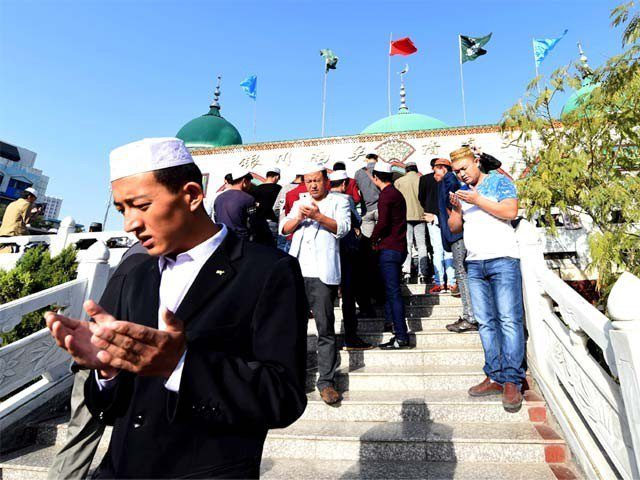Chinese state propaganda outlets are making a valiant push to convince the world that Muslims in China enjoy religious freedom, touting Ramadan services in Beijing, while children and Communist Party officials are banned from the traditional fast in western Xinjiang province, home to the nation’s Muslim Uighur minority.
The Chinese state-run newspaper People’s Daily published a photo essay Thursday touting Ramadan prayer services in Beijing, under the watchful eye of the Chinese Communist Party. “Many Muslims from all over China gathered at Niujie Mosque, the largest and oldest mosque in Beijing on June 7, the second day of Ramadan. Staff members working at the mosque said that there were more Muslims coming during this month,” the article read.
The Global Times, another state outlet, reported that “millions of Muslims” were free to observe Ramadan in China, highlighting the ethnic minorities in China with large Muslim populations – “the Hui, Uygur, Kazakh, Uzbek, Tajik and Kyrgyz” – and noting that, in central Gansu province, “the freedom to fast in the province is fully guaranteed.” The article notes that the government sent “senior leaders” to western Xinjiang province to visit “teachers and student at Xinjiang Islamic Institute,” but does not use the same language of religious freedom for Xinjiang as it does for Gansu.
Muslims in Xinjiang, most of the Uighur ethnic minority, are given significantly less religious freedom than Muslims elsewhere in China, though the communist government is hesitant to allow large displays of religiosity anywhere in the country. Beijing has long expressed concern about separatist Islamic terrorism in Xinjiang, orchestrated by groups such as the East Turkestan Islamic Movement based in the region. Under the guise of fighting “extremism,” China has significantly limited the freedom of Muslims in Xinjiang to practice their religion.
While publishing reports on Ramadan observances in global publications, the website of local Xinjiang government agencies have posted a number of restrictions regarding observing Ramadan, especially fasting during the day. Civil servants, members of the Communist Party, teachers, and students are all banned from fasting and “religious activities,” a ban strictly enforced by home visits and forced eating in schools.
“If we think that someone may be fasting, we will invite them to the village office to ‘drink tea’ with us to see if they are fasting or not,” Alim Abdurahman, a Xinjiang official, said in an interview, according to Radio Free Asia. He also confirmed minors are not allowed to enter mosques.
Xinjiang has also enacted a number of year-round limitations on Muslims, including a burqa ban in the capital, Urumqi; a ban on wearing Islamic garb or “large beards” on public transportation; and the forced sale of a variety of alcohol and cigarette brands in every shop to discourage following sharia law, which prohibits both.
Despite these restrictions, China continues to publish propaganda claiming Muslims are completely free to worship in the communist country. “[China] fully respects its citizens’ religious needs. During the month of Ramadan, Muslim restaurants can decide whether they want to do business. There will be no interference,” read a government white paper released shortly before the start of Ramadan. The paper touts Chinese Muslims’ alleged “unprecedented religious freedom” in Xinjiang without mentioning the ban on minors entering mosques or restrictions on fasting.

COMMENTS
Please let us know if you're having issues with commenting.